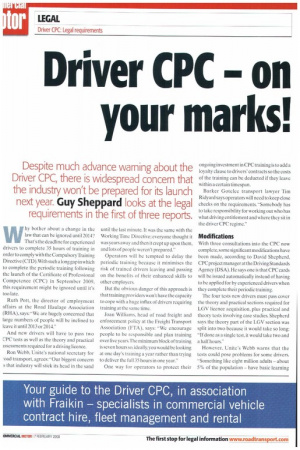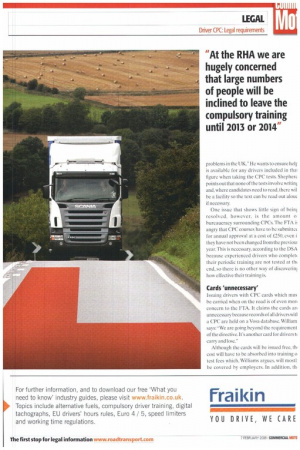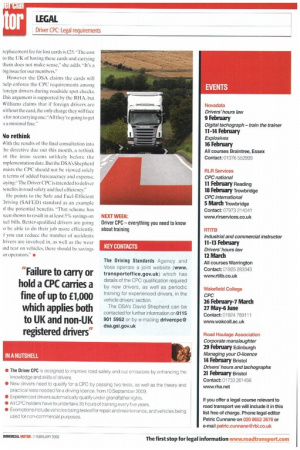Driver CPC on your marks!
Page 28

Page 29

Page 30

If you've noticed an error in this article please click here to report it so we can fix it.
Despite much advance warning about the Driver CPC, there is widespread concern that the industry won't be prepared for its launch next year. Guy Sheppard looks at the legal requirements in the first of three reports.
Why bother about a change in the law that can he ignored until 2014? That's the deadline for experienced drivers to complete 35 hours of training in order to comply with the Compulsory Training Directive (CTD).With such a long gap in which to complete the periodic training following the launch of the Certificate of Professional Competence (CPC) in September 2009, this requirement might be ignored until it's too late.
Ruth Pott, the director of employment affairs at the Road Haulage Association (RHA), says: "We are hugely concerned that large numbers of people will be inclined to leave it until 2013 or 2014."
And new drivers will have to pass two CPC tests as well as the theory and practical assessments required for a driving licence.
Ron Webb, Unite's national secretary for -oad transport, agrees: "Our biggest concern s that industry will stick its head in the sand until the last minute. It was the same with the Working Time Directive; everyone thought it was years away and then it crept up upon them, and lots of people weren't prepared."
Operators will be tempted to delay the periodic training because it minimises the risk of trained drivers leaving and passing on the benefits of their enhanced skills to other employers.
But the obvious danger of this approach is that training providers won't have the capacity to cope with a huge influx of drivers requiring training at the same time.
Joan Williams, head of road freight and enforcement policy at the Freight Transport Association (FTA), says: "We encourage people to be responsible and plan training over five years.The minimum block of training is seven hours so, idea Ily. you would be looking at one day's training a year rather than trying to deliver the full 35 hours in one year.
One way for operators to protect their ongoing investment in CPC training is to add a loyalty clause to drivers' contracts so the costs of the training can be deducted if they leave within a certain timespan.
Barker Gotelee transport lawyer Tim Ridyard says operators will need to keep close checks on the requirements. "Somebody has to take responsibility for working out who has what driving entitlement and where they sit in the driver CPC regime."
Modifications With three consultations into the CPC now complete, some significant modifications have been made, according to David Shepherd, CPC project manager at the Driving Standards Agency (DSA). He says one is that CPC cards will be issued automatically instead of having lobe applied for by experienced drivers when they complete their periodic training.
The four tests new drivers must pass cover the theory and practical sections required for LGV licence acquisition, plus practical and theory tests involving case studies. Shepherd says the theory part of the LGV section was split into two because it would take so long: "If done as a single test, it would take two and a half hours."
However, Unite's Webb warns that the tests could pose problems for some drivers. "Something like eight million adults about 5% of the population have basic learning problems in the-UK." He wants to ensure heir is available for any drivers included in thai figure when taking the CPC tests. Shepherc points out that none of the tests involve writiN and. where candidates need to read, there wil be a facility so the text can be read out about if necessary.
One issue that shows little sign of heir resolved, however, is the amount o bureaucracy surrounding CPCs. The FTA angry that CPC courses have to be submit ter. for annual approval at a cost of £250, even i they have not been changed from the previou: year.This is necessary. according to the DSA because experienced drivers who complett their periodic training are not tested at tht end, so there is no other way of discoverim how effective their training is.
Cards 'unnecessary'
Issuing drivers with CPC cards which mus be carried when on the road is of even mon concern to the FTA. It claims the cards an unnecessary because records of all drivers wit] a CPC are held on a Vosa database. William says: "We are going beyond the requirement of the directive. It's another card for drivers tt carry and lose."
Although the cards will be issued free, th. cost will have to be absorbed into training o test fees which. Williams argues. will mostl: be covered by employers. In addition, th. replacement fee for lost cards is f25."The cost to the UK of having these cards and carrying them does not make sense," she adds. "It's a big issue for our members."
However the DSA claims the cards will help enforce the CPC requirements among Eoreign drivers during roadside spot checks. This argument is supported by the RHA, but Williams claims that if foreign drivers are without the card, the only charge they will face s for not carrying one:"All they're going to get s a minimal fine."
No rethink
With the results of the final consultation into le directive due out this month, a rethink 3n the issue seems unlikely before the mplementation date. But the MA's Shepherd nsists the CPC should not be viewed solely n terms of added bureaucracy and expense, aying:-The Driver CPC is intended to deliver )enefits in road safety and fuel efficiency."
He points to the Safe and Fuel-Efficient Driving (SAFED) standard as an example )1 the potential benefits. "That scheme has )een shown to result in at least 5% savings on uel bills. Better-qualified drivers are going o be able to do their job more efficiently. f you can reduce the number of accidents irivers are involved in, as well as the wear Ind tear on vehicles, there should be savings or operators." to








































































































































































